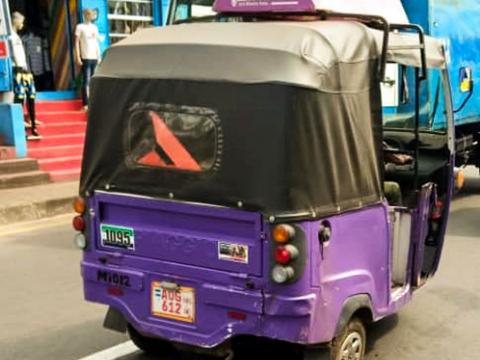By Mabinty M. Kamara
Kekeh (Rickshaw) riders within the Sierra Leonean capital, Freetown, have said they might not obey the new transport fares that has been announced by the government, citing its implication on their livelihoods.
Last week, among a raft of new measures, the government reduced fuel prices and negotiated the reduction of transport fares for all forms of commercial transport. As per the new fares, Kekeh are supposed to collect Le1, 500 per destination, down from Le2000.
Two weeks ago, Kekeh riders had already been ordered to reduce their passengers to two, from three. This was part of measures by the government in its fight to prevent a spread of covid-19, and it affected all other forms of public transport providers.
The Kekeh riders argue that in light of the reduction in passenger, it’s unfiar to ask for a reduction of the fares.
Foday Kamara, a Keke rider within Freetown, who said the directive was unreasonable, said he and some of his colleagues were considering a sit down strike.
“Fuel was Le 6,000 and we used to take three passengers at Le2, 000 per passenger. So I don’t understand why they have to drop our price to Le 1, 500 because fuel price has gone down to Le 7,000, at a time they know that we are not running normally because of coronavirus,” he said.
He added: “Some of us will rather pack our Keke than to be on the streets for the whole day with nothing to show for it. I cannot ride Keke for Le 1,500. Not at this moment."
Passengers in Freetown depend on Kekeh a lot as a mode of transportation, partly because of its flexibility to navigate through the city’s usually jam-packed traffic.
But fellow Kekeh rider, Ibrahim Bah, has no intention of packing his vehicle. He said passengers will feel the brunt of the problem if the price change comes in to effect.
Commercial transport drivers are notorious for plying half of the route and charging either the same amount or double the actual transport fares for a full route.
“This is where I make my living. So I will not pack it for any situation, except if my life is under threat. I must find a way out. If you want to board my Keke, it’s fine. If you can’t, then I go my way. It’s as simple as that. We must survive," he said.
"In this kind of situation where we have the police and wardens, we have to buy fuel and at the same time be able to pay to the master at the end of the day. It will not be easy for us if we go by that price,” Bah added.
The revenue of commercial transport drivers in the city has also been affected by corrupt traffic police officers and road safety corps.
But Ramatu Dumbuya, a passenger onboard Bah's Keke during this interview, said the riders were just "unnecessarily wicked".
“They are just being unnecessarily wicked to us. If the government had increased the price, they would have gladly done that. They should leave us out of their problems with the police on the streets because I believe that if they do the right thing, they won’t have cause to give them free money,” she lamented,
She added: “But in all of this, I blame the very government for not being able to effectively monitor them and the fact that there isn't much government owned commercial transport for town service.”
Burno Samba Kamara, National President for the Keke Riders Union, told Politico in a telephone interview that they tried to convince the government as an executive to understand their situation but that the Minister of Transport and Aviation said they must go by the directive.
“We even told them our constraints that even with three passengers to raise Le100, 000 per day to give to the master of the Keke was a problem, let alone that they have asked us to cut down to two passengers and at the same Le2, 000. So if they now say we have to reduce the prices because fuel prices have gone down, the business will go at a loss. So what do I do as a president?” he explained.
Kamara said he would try to hold a meeting with his members so they will understand the situation. He said the situation isn't easy for them because most of the Kekes are owned by corporate institutions.
“Unfortunately for us, most of those Keke’s you see are owned by corporate institutions like banks and micro credits, who give them out to our members on loan. And it is difficult for them to reduce their daily pay because they are cooperate intuitions. Out of every 10 Keke you see on the streets, it’s only one that was bought in cash. All the rest were given on loan,” he said.
If the Kekeh riders decide to go on strike, it will worsen an ongoing
public transportation crisis caused over the last week by the decongestion of public transports.
Copyright © 2020 Politico Online








